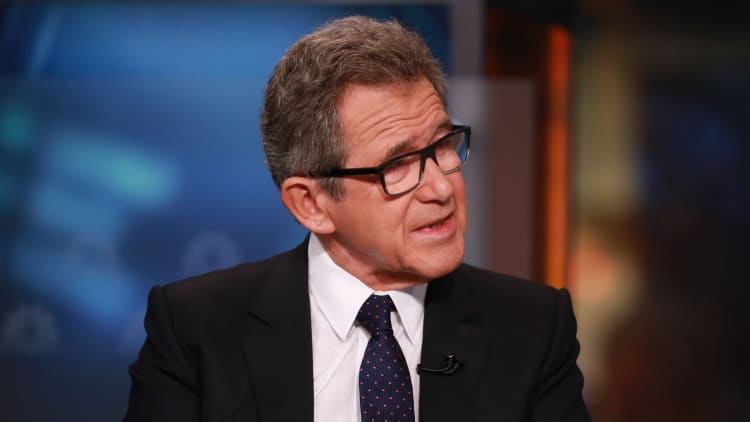The price of oil has gone negative after weeks of oil sands output selling for less than a pint of beer per barrel. Banks are preparing for a wave of oil bankruptcies by setting up their own oil companies to operate seized assets. Regulators in Texas are considering setting limits on the state's production, an approach more reminiscent of Soviet-style central planning than a Republican-controlled regulatory body. An oil company executive just admitted, "No one wants to give us capital because we have all destroyed capital and created economic waste."
And the energy sector's valuation is shrinking to such a degree that it has become the second smallest segment in the entire S&P index, with its weighting down 80% from a decade ago.
All of these developments would have been unthinkable just a few months ago, and yet all are headlines from just the past week in the oil patch. This remarkable shift has implications that go well beyond any near-term damage to the industry's finances. The change in narrative — from a focus on the industry's resilience to its fragility — threatens to reframe how the financial community thinks about the future of the oil and gas industry, and even its very investability in a world beset by geopolitical infighting and looming demand destruction from the low-carbon transition. Long after some semblance of stability is restored to the world economy, the industry's downgrade in investability threatens to be the longest-lasting and most consequential impact of the COVID-19 crisis on the oil and gas sector.

In political theory, the concept of the Overton Window explains how ideas can go from the fringe to the center of discourse ("from the unthinkable to the mainstream") with great rapidity, and how public perception of what is a "mainstream" idea can influence the real world actions of those who actually decide what policies get implemented and which get ignored.
A similar process may be at work in the financial community's thinking about the oil and gas sector. For decades, the oil and gas sector sat athwart the financial world, with index-beating returns that placed their stocks at the core of many investors' portfolios. In 1980, 7 of the 10 largest stocks in the S&P 500 were oil companies, representing 29% of the index. As recently as a decade ago, that weighting was 15%. Today, with Exxon having dropped to No. 28, there are no oil companies in the top 10 for the first time in the history of the S&P, and the industry's weighting is below 3% — its lowest in history. The oil industry has gone from the mainstream to the fringes of investors' portfolios with remarkable speed.
The COVID-19 crisis, and the tremendous drop in oil prices that it has brought about, threatens to make this shift permanent by redefining the financial community's sense of what a worst-case scenario looks like for the oil industry. In effect, we are witnessing a real-time movement of the Overton Window, as an industry that used to tout its resilience at oil prices as low as $40 is now facing a prolonged period where prices may be half that amount or less.
The world's last barrel of oil
The industry's claims of resilience in the face of climate change came in response to years of engagement by major investors pushing oil companies to consider the strategic implications of a low-carbon transition for their business. While the companies differed in how they responded to these inquiries, there was one common theme: all of them claimed that, while there might be asset strandings in the industry as a result of climate change, it wouldn't be their assets that got stranded. Somehow, the oil industry was composed of dozens of major companies, all of whom would be the ones producing the last barrel of oil as the world moves away from fossil fuels.
Conveniently for the industry, the oil price that most companies used to "stress test" their portfolios against a low-carbon future was around $40/barrel--basically the level at which these companies break even. What the COVID-19 crisis has revealed, however, is that the industry's actual worst case scenario is much more challenging and much less comforting to its investors — a price that according to one industry executive means that "we will disappear as an industry." It seems clear, with all that has happened in the past few weeks, that investors will never look at this sector the same way again.
The industry, at least those companies that survive the downturn, needs to prepare for a very different kind of future, one in which volatility and uncertainty around demand will rule the day.
This crisis is confronting the industry with a stress test that mirrors the sort of demand shock it could face in a decarbonizing future. Just last summer, Mark Lewis with BNP Paribas wrote a white paper arguing that advances in electric vehicle technology would eventually force the price of oil down to $10-$20/barrel — precisely where it is trading today, though at the time the idea was derided as unthinkable. What the current situation makes clear is that few if any oil companies can survive that sort of environment. A key difference is that the current situation is likely to be temporary, whereas demand destruction related to the low-carbon transition will be permanent. Why would an investor risk capital in an industry saddled with debt where the main product can go below breakeven costs for long periods of time?
So what can be done? The industry -- at least those companies that survive the downturn — needs to prepare for a very different kind of future, one in which volatility and uncertainty around demand will rule the day, and the only companies that attract capital will be the ones with detailed, specific and ambitious plans for managing the transition, and even pivoting to renewable energy — or for winding down their assets in an orderly way.
Prodded by investors, including those making up Climate Action 100+, a few companies, including Shell, BP and Repsol, are taking steps to move in that direction. Yet that leaves much of the industry — and substantial investor capital — at risk as the Overton Window continues to shift toward a low-carbon future.
—By Andrew Logan, senior director of oil and gas at Ceres, a nonprofit organization that works with institutional investors and companies on sustainability





